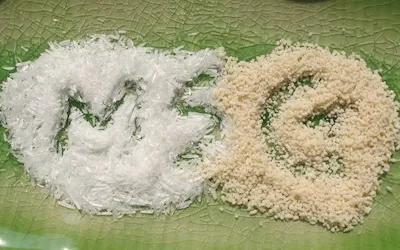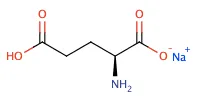MSG: Monosodium Glutamate
Updated | 2018-01-28
Reviewed by the NatureClaim Team

Monosodium glutamate (MSG) is recognized by the tongue as "umami" (savory) and is sometimes described as the fifth taste (along with bitter, salty, sour, and sweet). MSG has one sodium atom and glutamate, a molecule derived from the nonessential amino acid, glutamic acid. The free glutamate is naturally occurring in seaweed, from which it was first isolated in 1908. Free glutamate is also naturally occurring in human breast milk, Parmesan cheese, tomatoes, and other foods.

Monosodium glutamate (MSG)
After its isolation, MSG became common in Asian cuisines as a flavor enhancer. In 1968, Dr. Robert Kwok described "numbness at the back of the neck" while dining at a Chinese restaurant and coined the term Chinese Restaurant Syndrome (now known as MSG symptom complex). He stated that these symptoms may have occurred due to the Chinese cooking wine, sodium content, or MSG. This caused some attention and many studies in mice, rats, and primates followed suit. These studies examined the neurotoxic and other negative health effects (including asthma and obesity) associated with MSG. However, the evidence was contradictory.
In addition, the results from animal clinical trials could not be compared to human clinical trials. A major disconnect between animal and human clinical trials appeared. In the late 1990's and early 2000's, health and food organizations, including FAO (Food and Agriculture Organization), WHO (World Health Organization), and FDA (Food and Drug Administration), concluded that human clinical trials have failed to show a relationship between MSG and MSG symptom complex.
Acute, short-term, and self-limiting complex side effects associated with MSG symptom complex may include:
- Numbness in the back of the neck, arms, and back
- Burning sensation at the back of the neck, forearms, and chest
- Facial pressure or tightness
- Chest pain
- Headache
- Nausea
- Upper body tingling and weakness
- Palpitations
- Drowsiness
- Bronchospasm (asthmatics only)
Once MSG is ingested, it is broken down into free glutamate and sodium. In the United States about 1 g/day is the normal dietary intake and another 0.55 g/day comes from added MSG. It is thought that doses of MSG over 3 grams a day can cause MSG symptom complex, especially on an empty stomach. As is the case for too much salt, too much MSG may be unhealthy. So, like salt, use MSG sparingly.
Reference(s):
Husarova V, Ostatnikova D. Monosodium glutamate toxic effects and their implications for human intake: a review. JMED Research. 2013.
Vu Thi Thu H, Wakita A, Shikanai S, Iwamoto T, Wakikawa N, Yamamoto S. Epidemiological studies of monosodium glutamate and health. Journal of Nutrition and Food Sciences. 2013.
"Monosodium Glutamate" was written by Korey Brownstein, Ph.D.
